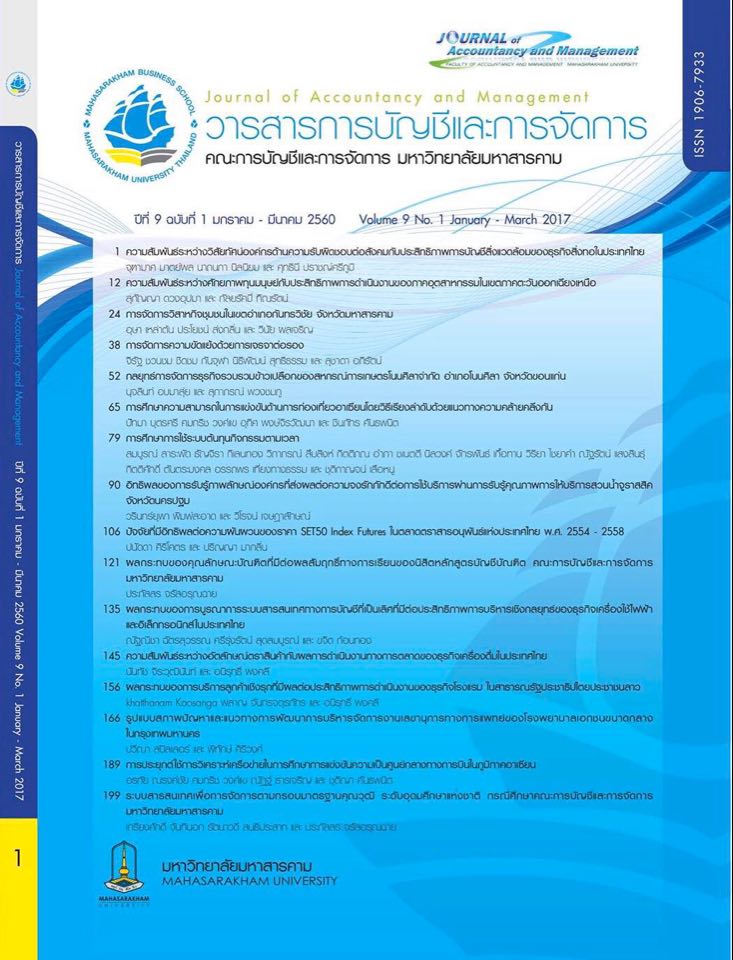ความสัมพันธ์ระหว่างอัตลักษณ์ตราสินค้ากับผลการดำเนินงานทางการตลาดของธุรกิจเครื่องดื่มในประเทศไทย
Main Article Content
บทคัดย่อ
การวิจัยครั้งนี้มีวัตถุประสงค์ เพื่อทดสอบความสัมพันธ์ระหว่างอัตลักษณ์ตราสินค้ากับผลการดำเนินงานการตลาดของธุรกิจเครื่องดื่มในประเทศไทย โดยใช้แบบสอบถามเป็นเครื่องมือในการเก็บรวบรวมข้อมูล จากผู้ประกอบการธุรกิจเครื่องดื่มของธุรกิจเครื่องดื่มในประเทศไทย จำนวน 109 คน สถิติที่ใช้ในการวิเคราะห์ข้อมูล ได้แก่ การวิเคราะห์สหสัมพันธ์แบบพหุคูณ และ
การวิเคราะห์การถดถอยเชิงพหุคูณ ผลการวิจัย พบว่า อัตลักษณ์ตราสินค้าด้านลักษณะทางกายภาพ และด้านความสัมพันธ์
ตราสินค้า มีความสัมพันธ์และผลกระทบเชิงบวกกับ ผลการดำเนินงานทางการตลาดโดยรวม ส่วนอัตลักษณ์ตราสินค้า
ด้านบุคลิกภาพตราสินค้าไม่ส่งผลกระทบเชิงบวกต่อผลการดำเนินงานทางการตลาด ดังนั้น ผู้ประกอบการธุรกิจเครื่องดื่ม
ควรให้ความสำคัญการผลิตและพัฒนาคุณภาพของสินค้า สร้างคุณลักษณะที่โดดเด่น เพื่อให้ผู้บริโภคจดจำ เชื่อถือ และไว้วางใจในตราสินค้า อยู่เสมอ ทั้งยังควรส่งเสริมกิจกรรมทางการตลาดอย่างต่อเนื่อง เพื่อให้ผู้บริโภคจดจำและรับรู้ตราสินค้า
อย่างกว้างขวาง เกิดความประทับใจ และกลับมาซื้อซ้ำอยู่ตลอดเวลา มุ่งเน้นการจัดการลูกค้าสัมพันธ์ เพื่อรักษาฐานลูกค้าเก่าที่มีความจงรักภักดีต่อตราสินค้าและดึงดูดลูกค้าใหม่ และให้ความสำคัญกับภาพลักษณ์ตราสินค้า ซึ่งจะส่งผลต่อการเชื่อมโยงชื่อเสียง และการยอมรับในตราสินค้า สามารถสร้างความได้เปรียบในการแข่งขัน ซึ่งจะทำให้การดำเนินงานทางการตลาดของธุรกิจประสบความสำเร็จ และใช้เป็นแนวทางในการพัฒนาขีดความสามารถของธุรกิจให้แข่งขันในตลาดได้
Downloads
Article Details
บทความที่ได้รับการตีพิมพ์เป็นลิขสิทธิ์ของวารสารการบัญชีและการจัดการ
ข้อความที่ปรากฏในบทความแต่ละเรื่องในวารสารวิชาการเล่มนี้เป็นความคิดเห็นส่วนตัวของผู้เขียนแต่ละท่านไม่เกี่ยวข้องกับมหาวิทยาลัยมหาสารคาม และคณาจารย์ท่านอื่นๆในมหาวิทยาลัยฯ แต่อย่างใด ความรับผิดชอบองค์ประกอบทั้งหมดของบทความแต่ละเรื่องเป็นของผู้เขียนแต่ละท่าน หากมีความผิดพลาดใดๆ ผู้เขียนแต่ละท่านจะรับผิดชอบบทความของตนเองแต่ผู้เดียว
เอกสารอ้างอิง
กรมโรงงานอุตสาหกรรม. (2557). ข้อมูลธุรกิจเครื่องดื่มในประเทศไทย. ค้นเมื่อ 12 มกราคม 2556, จาก https://www.diw.go.th/hawk/default.php.
จุฑาภรณ์ ไชยา. (2550). ความสัมพันธ์ระหว่างศักยภาพการแข่งขันทางการตลาดกับผลการดำเนินงานของธุรกิจจำหน่าคอมพิวเตอร์ในภาคตะวันออกเฉียงเหนือ. วิทยานิพนธ์ สาขาการจัดการตลาด : มหาวิทยาลัยมหาสารคาม.
เฉลิมพล ชนะมินทร์. (2556). ผลกระทบของคุณค่าตราสินค้าที่มีต่อผลการดำเนินงานของธุรกิจอาหารและเครื่องดื่มในประเทศไทย.
วิทยานิพนธ์ สาขาการจัดการตลาด, มหาวิทยาลัยมหาสารคาม.
ชิสากัญญญ์ ศุภวงค์ธนากานต์. (2557). การรับรู้ตราสินค้าอิชิตันชาเขียวของผู้บริโภคในเขตกรุงเทพมหานครและปริมาณฑล. (บธ.ม. สาขาการตลาด) มหาวิทยาลัยธุรกิจบัณฑิตย์.
รัตชพงษ์ เขียวพันธุ์. (2553). แนวทางในการสร้างและพัฒนาอัตลักษณ์ตราสินค้าของสโมสรฟุตบอลไทย.
วิทยานิพนธ์ (บธ.ม. สาขาการตลาด) มหาวิทยาลัยนเรศวร.
วิรัช ลภิรัตนกุล. (2546). การประชาสัมพันธ์. (พิมพ์ครั้งที่ 10). กรุงเทพมหานคร : โอเดียนสโตร์
วิทวัส ชัยปาณี. (2546). Brand Building Through Consume Insight ”สร้างแบรนด์. กรุงเทพฯ : ทิปปิ้ง พอยท์,
ศรีกัญญา มงคลศิริ. (2547). Brand Management. กรุงเทพฯ : เลิฟ แอนด์ ลิฟ.
ศูนย์วิจัยกสิกรไทย. (2556). สถานการณ์การแข่งขันของธุรกิจเครื่องดื่มประเทศไทย. ค้นเมื่อ 9 ธันวาคม 2556. จาก https://www.kasikornresearch.com/th/k-econanalysis/pages/ViewSummary.aspx?docid=31647
สำนักงานคณะกรรมการส่งเสริมการลงทุน. (2556). ตลาดเครื่องดื่มในประเทศไทย. ค้นเมื่อ 8 กันยายน 2556. จาก https://www.boi.go.th.
สมชัย สุทริยากร. (2548). ดัชนีชี้วัดผลการดำเนินงานทางการตลาด. ค้นเมื่อ 17 กุมภาพันธ์ 2557.
จาก
Aaker, D. A., Kumar, V. & Day, G. S. (2001). Marketing research.7th ed. New York : John Wiley & Son.
Akkarawimut, K. and Ussahawanitchakit, P. (2010). The impacts of brand loyalty strategy on marketing performance : An empirical study of garment business in Thailand. International Journal of Business Strategy, 10(4) : 33-47.
Black, K. (2006). Business statistics : for contemporary decision making. 4th ed. USA : John Wiley & Sons.
Budelmann, K., Yang K. & Curt W. (2010). Brand identity essentials : 100 principles for designing logos and building. New York : Rockport Publishers.
Kapferer, J. N. (1997). Managing luxury brands. Journal of Brand Management, 4(4) : 251-260.
Nunnally, J. C. (1978). Psychometric Theory. 2th ed. New York : McGraw – Hill.
Nunnally, J. C. & I. H. Bernstein. (1994). Psychometric Theory, New York : McGraw – Hill.
Saekoo, A. & Ussahawanitchakit, P. (2010). Building brand equity strategy of exporting businesses in Thailand : An empirical investigation of its antecedents and consequences. International Journal of Strategic Management, 10(2) : 1-25.
Schmidt, K. & Ludlow, C. (2002). Inclusive Branding : The why and how of a holistic approach to brands. Basingstoke : Palgrave Macmillan.


